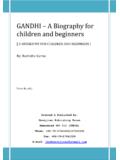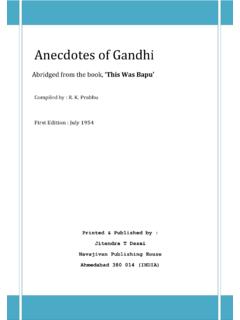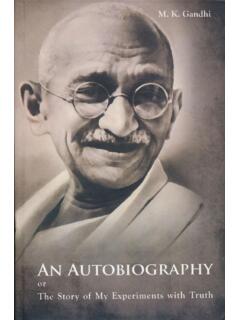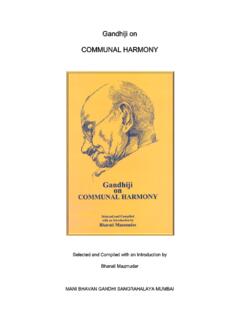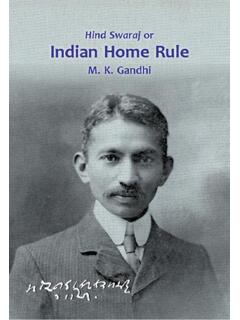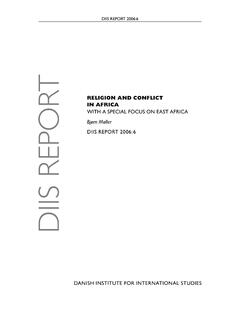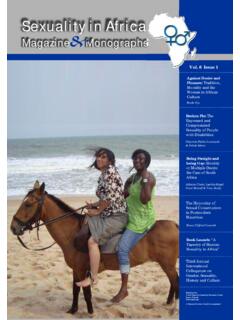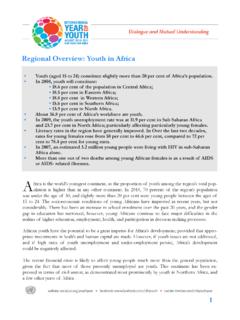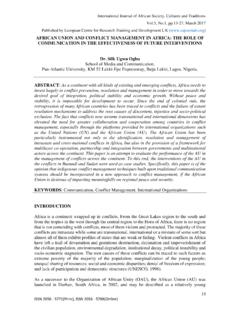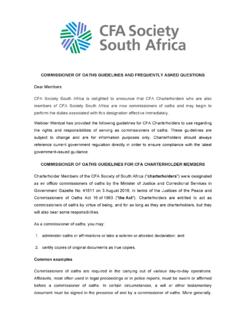Transcription of Handbook of Peace and Conflict Studies - Mahatma Gandhi
1 Handbook of Peace andConflict StudiesThefields of Peace and Conflict Studies have grown exponentially since their initiation inScandinavia about a half century ago by Johan Galtung. They have forged a transdisciplinaryand professional identity distinct from security Studies , political science and Routledge Handbook of Peace and Conflict Studies offers a cutting-edge and transdisciplinaryoverview of the main issues, debates, state-of-the-art methods and key concepts in Peace andconflict Studies today. The volume is divided into four sections, commencing with Under-standing and Transforming Conflict , moving sequentially through Creating Peace and Sup-porting Peace , and culminating with Peace Across the Disciplines . Each section features newessays by distinguished international scholars and/or professionals working in Peace Studies andconflict resolution and transformation. Drawing from a wide range of theoretical, method-ological and political positions, the editors and contributors offer topical and enduringapproaches to Peace and Conflict book will be essential reading for students of Peace Studies , Conflict Studies and conflictresolution.
2 It will also be of interest and use to practitioners in Conflict resolution and NGOs, aswell as policymakers and Webel is currently Fulbright Senior Specialist in Peace and Conflict Studies . During2005, he was Director of the Centre of Peace Studies and a professor of social science at theUniversity of Troms , Norway. He is the author of Terror, Terrorism, and the Human Condition(2005) and co-author with David P. Barash of Peace and Conflict Studies (2002).Johan Galtung is widely acknowledged as the founder of Peace Studies and Peace research. Hehas published extensively in these fields. He is currently co-director of TRANSCEND, a globalnetwork of Peace scholars and Conflict of Peace andConflict StudiesEdited byCharles Webel and Johan GaltungFirst published 2007by Routledge2 Park Square, Milton Park, Abingdon, Oxon, OX14 4 RNSimultaneously published in the USA and Canadaby Routedge270 Madison Avenue, New York NY 10016 Routledge is an imprint of the Taylor and Francis Group, an informa business 2007 Selection and editorial matter Charles Webel and Johan Galtung; individual chapters,the contributorsAll rights reserved.
3 No part of this book may be reprinted or reproduced or utilized in any form orby any electronic, mechanical or other means, now known or hereafter invented, includingphotocopying and recording, or in any information storage or retrieval system, without permissionin writing from the Library Cataloguing in Publication DataA catalogue record for this book is available from the British LibraryLibrary of Congress Cataloging in Publication DataHandbook of Peace and Conflict Studies / edited by Charles Webel and Johan bibliographical references and Peace -building. 2. Conflict management. I. Webel, Charles. II. Galtung, 6 dc222006027025 ISBN10: 0 415 39665 4 (hbk)ISBN10: 0 203 08916 2 (ebk)ISBN13: 978 0 415 39665 3 (hbk)ISBN13: 978 0 203 08916 3 (ebk)This edition published in the Taylor & Francis e-Library, 2007. To purchase your own copy of this or any of Taylor & Francis or Routledge scollection of thousands of eBooks please go to ISBN 0-203-08916-2 Master e-book ISBNC ontentsList of IllustrationsviiiNotes on ContributorsixIntroduction11 Introduction: toward a philosophy and metapsychology of peace3 Charles Webel2 Introduction: Peace by peaceful Conflict transformation theTRANSCEND approach14 Johan GaltungPart 1: Understanding and transforming conflict3 Negotiation and international conflict35 Fen Osler Hampson, Chester A.
4 Crocker and Pamela R. Aall4 Mediation51 Sara Horowitz5 Former Yugoslavia and Iraq: a comparative analysis of international conflictmismanagement64 Jan Oberg6 Peace Studies and Peace politics: multicultural common security inNorth South Conflict situations86 Kinhide Mushakojiv7 Disarmament and survival94 Marc Pilisuk8 Nuclear disarmament106 David KriegerPart 2: Creating peace9 Counselling and training for Conflict transformation and Peace -building:the TRANSCEND approach123 Wilfried Graf, Gudrun Kramer and Augustin Nicolescou10 Nonviolence: more than the absence of violence143J rgen Johansen11 Human rights and peace160 Jim Ife12 Reconciliation173 Joanna Santa-Barbara13 Peace as a self-regulating process187 Dietrich FischerPart 3: Supporting peace14 Gender and Peace : towards a gender-inclusive, holistic perspective209 Tony Jenkins and Betty A. Reardon15 Peace business: an introduction232 Jack Santa-Barbara16 Peace Journalism248 Jake Lynch and Annabel McGoldrick17 Peace psychology: theory and practice265 Antonella Sapio and Adriano Zamperini18 Rethinking Peace education279 Alicia Cabezudo and Magnus HaavelsrudPart 4: Peace across the disciplines19 Peace Studies as a transdisciplinary project299 Chadwick F.
5 AlgerviCONTENTS20 The spirit of war and the spirit of Peace : understanding the role of religion319 Graeme MacQueen21 International law: amid power, order and justice333 Richard Falk22 The language-games of peace345 Anat Biletzki23 Peace and the arts355 Patrick McCarthy24 Peace through health?367 Neil AryaPart 5: Conclusion25 Peace and Conflict Studies : looking back, looking forward397 Johan Galtung and Charles WebelIndex401viiCONTENTSList of Peace by peaceful Conflict transformation: a TRANSCEND Ten faultline dimensions and two levels of Peace : negative and positive, direct, structural, Eight components of Some examples of positive and negative feedback Six defects of a feedback system, with possible Some potential remedies against the six basic defects in socialfeedback Traditional and Peace business Galtung s Differences between traditional psychology and Peace Functions appearing in names of UN Systems Rights and responsibilities.
6 Individual and Three interactional responses to an Interactive-emotional Relationships in time and The dialectics between theory and Emergence of Peace tools in the League of Nations and the Now, silkscreen and paint on Peace through health working Breaking the chain of war: medical Peace action in a framework ofprevention383viiiNotes on ContributorsPamela R. Aall is Vice President for Education at the US Institute of Peace . She is alsoPresident of Women in International Security, an organization dedicated to promoting thevisibility and influence of women in foreign affairs. With Chester A. Crocker and Fen OslerHampson, she is co-editor of several books, including Turbulent Peace : The Challenges of ManagingInternational Conflict (2001) and Grasping the Nettle: Analyzing Cases of Intractable Conflict (2005).She also is co-author of Taming Intractable conflicts : Mediation in the Hardest Cases (2004) and theGuide to IGOs, NGOs and the Military in Peace and Relief Operations (2000).
7 Her research interestsinclude mediation in inter- and intra-state conflicts , non-official organizations in Conflict man-agement and resolution, and the role of education in exacerbating Conflict and F. Alger is Mershon Professor of Political Science and Public Policy Emeritus, theOhio State University. His research and teaching has focused on three linked themes. First isthe development of long-term strategies for Peace -building. He was Secretary General of theInternational Peace Research Association from 1984 to 1987. Second is the expanding Peace -building roles of some 30 organizations in the UN system, with special interest in the roles ofNGOs/civil society. For a number of years he conducted extensive field research at the UNHeadquarters in New York City and at the headquarters of the UN and UN SpecializedAgencies in Geneva, Switzerland. Third is the world relations of people and organizations inlocal communities. He is author of The United Nations System: A Reference Manual (2006) andeditor of The Future of the UN System: Potential for the Twenty First Century (1998).
8 He wasPresident of the International Studies Association, 1978 Arya is a family doctor involved with projects on violence reduction in El Salvador (post- Conflict ) and mental health in Palestine (active Conflict ). He has been a lecturer on Peacethrough Health both at McMaster and the University of Waterloo, and holds academic posi-tions in Environment and Resource Studies at the University of Waterloo, and FamilyMedicine both at McMaster University and the University of Western Ontario. He has servedas President of Physicians for Global Survival and Vice President of International Physicians forthe Prevention of Nuclear War. Dr Arya has published on health effects of small arms andixnuclear weapons, Peace through health, a health-based model of security, as well as varioushealth and environmental issues. He is co-editor of a book with Joanna Santa Barbara on Peacethrough Health (forthcoming).Anat Biletzki is Professor of Philosophy, Tel Aviv University and was a former chairperson ofB Tselem the Israeli Information Centre for Human Rights in the Occupied Biletzki s research interests range from Wittgenstein and Hobbes to analytic phil-osophy, political thought and human rights.
9 Her professional and philosophical activities con-verge in the area of human rights and she is often invited abroad for public lecturing, forseminars at human rights conferences, for interviews, and for meetings with human rightscounterparts all over the world. Publications include Paradoxes (1996), Talking Wolves: ThomasHobbes on the Language of Politics and the Politics of Language (1997), What Is Logic? (2002) and(Over)Interpreting Wittgenstein (2003).Alicia Cabezudo, from Argentina, specializes in Education for Democracy, Cultures of Peace ,and Human Rights, as rooted in recent Latin American history. She is Professor at the School ofEducation, University of Rosario, Argentina, and Education Coordinator at the UNESCOC hair on Culture of Peace and Human Rights, University of Buenos Aires. Her recent publica-tions include Educacion en Derechos Humanos. Un ejercicio para la Construccion de la Ciudadania(2006); Educacion para la Paz y los Derechos Humanos: un desafio actuala (2006); Learning to AbolishWar: Teaching toward a Culture of Peace , with Betty Reardon (2002); and Tasks and directions forthe global campaign for Peace education , also with Betty Reardon, in Disarmament ForumNewsletter, Volume 3, United Nations Institute for Disarmament Research, Geneva (2001).
10 Chester A. Crocker is James R. Schlesinger professor of strategic Studies at the WalshSchool of Foreign Service, Georgetown University. He served as chairman of the board of theUnited States Institute of Peace (1992 2004), and continues as a member of its board. From1981 to 1989, he was US Assistant Secretary of State for African affairs. He is the author of HighNoon in Southern africa : Making Peace in a Rough Neighborhood (1992), co-author (with Fen OslerHampson and Pamela Aall) of Taming Intractable conflicts : Mediation in the Hardest Cases (2004)and co-editor of Grasping the Nettle: Analyzing Cases of Intractable Conflict (2005), Turbulent Peace :The Challenges of Managing International Conflict (2001) and Herding Cats: Multiparty Mediation ina Complex World (1999).Richard Falk is Albert G. Milbank Professor of International Law Emeritus, Princeton Uni-versity and since 2002 Distinguished Visiting Professor, Global Studies , University of Californiaat Santa Barbara.

